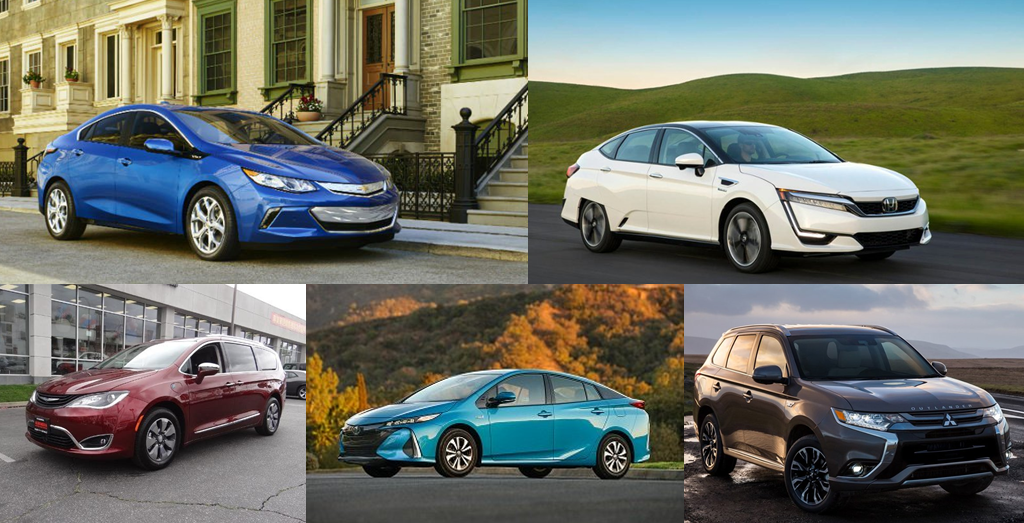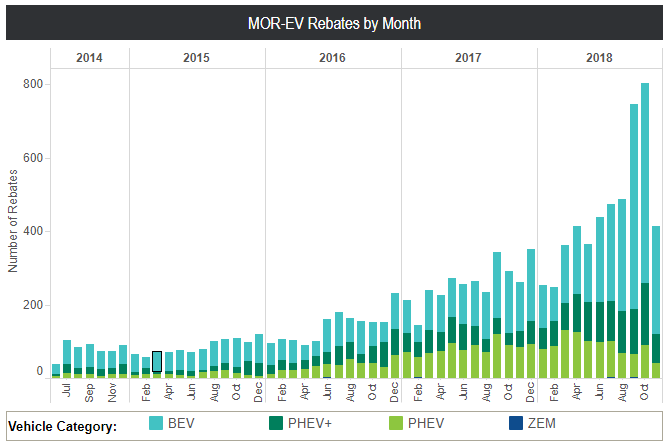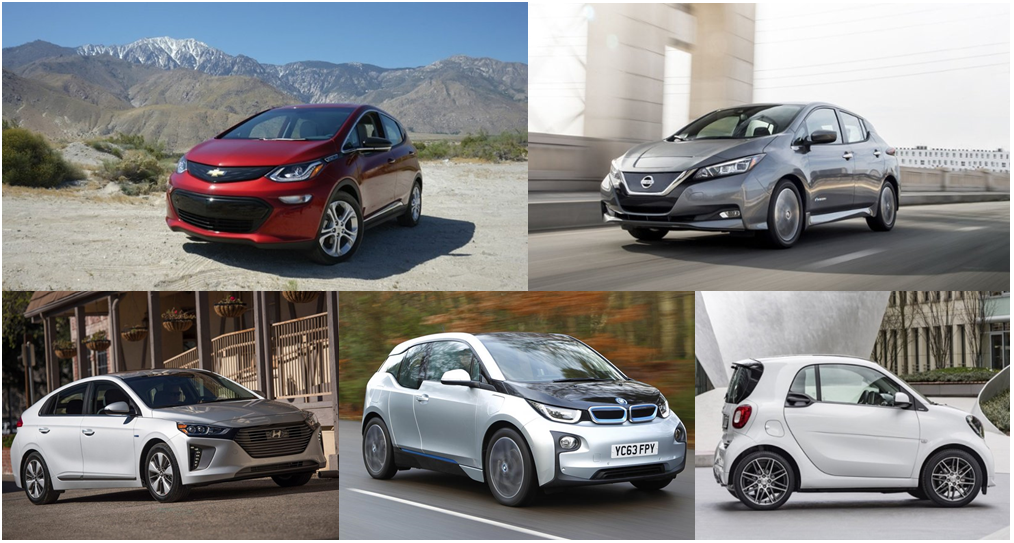Massachusetts Electric Vehicle Rebate Increased to $3,500
The Massachusetts Offers Rebates for Electric Vehicles Program (MOR-EV Program) has increased electric vehicle...

On December 6, 2018, the state of Massachusetts announced that it will extend the popular electric vehicle (EV) rebate program, Massachusetts Offers Rebates for Electric Vehicles (MOR-EV) through June 30, 2019. However, as of January 1, 2019, the rules of the program will change: only battery-electric vehicles (BEVs) with a sales price under $50,000 will qualify for the rebate, which will drop from $2,500 to $1,500. Though we applaud the state’s efforts to extend this important incentive, we know the Commonwealth needs to be doing more to spur electric vehicle adoption.
Massachusetts instituted the MOR-EV rebate in 2014. Since then, it has helped more than 11,000 drivers get electric vehicles. Any Massachusetts resident who purchases a qualifying electric vehicle (or leases one for a minimum of 36 months) can apply for the rebate online and expect a check in the mail within three months of application. Full program rules and info can be found at: https://mor-ev.org/
The MOR-EV rebate has been crucial in getting the electric vehicle market off the ground, particularly as the up-front costs of an electric vehicle are still higher than those of a gas-powered car. (That is changing quickly as battery prices come down.)
 These plug-in hybrids will no longer qualify for the Massachusetts state rebate as of January 1, 2019.
These plug-in hybrids will no longer qualify for the Massachusetts state rebate as of January 1, 2019.
Funding for the MOR-EV rebate comes from the Regional Greenhouse Gas Initiative (RGGI) auctions. RGGI is a market-based program to reduce greenhouse gas (GHG) emissions from power plants in Massachusetts, Rhode Island, Connecticut, Delaware, Maine, Maryland, New Hampshire, New York, and Vermont. Essentially, the RGGI program sets a cap each year for the amount of GHG emissions power plants in these states can emit. Generators then bid in auctions to purchase allowances, or the right to emit a certain amount of GHG emissions. Massachusetts has used the proceeds of these auctions to, among other things, fund the MOR-EV program.
Recently, however, applications for the rebate have increased dramatically. Here’s a screenshot of a graph from MOR-EV’s website of rebates issued since the program’s inception – look at the growth we’ve seen recently!

As a result of this trend, money is flowing out of the program bucket faster than it’s coming in. To sustain the rebate, the state has had to change the program rules.
As of January 1, the graph will continue growing only in the pale blue BEV section in the graph above. Rebates will no longer be issued for the green plug-in hybrids (PHEVs).
First of all, we understand the situation that the Baker administration is facing. It is difficult to fund consumer rebates for EVs. Given that resources are scarce, we support their decision to narrow eligibility for the rebate to cars that are all-electric and that sell for less than $50,000. With this new structure in place as of January 1, we encourage interested people to look carefully at cars such as the Chevrolet Bolt, Nissan LEAF, Hyundai Ioniq EV, BMW i3, and smart electric fortwo.
 These battery-electric vehicles will still qualify for the state MOR-EV rebate, the rebate amount will decline from $2,500 to $1,500 on January 1, 2019.
These battery-electric vehicles will still qualify for the state MOR-EV rebate, the rebate amount will decline from $2,500 to $1,500 on January 1, 2019.
However, we must reduce greenhouse gas emissions in the transportation sector. RGGI has done a great job of bringing down emissions in the power generation sector, as have state laws like our Renewable Energy Portfolio Standard. In fact, the largest chunk of our GHG emissions now comes from transportation. (You can learn more about the environmental benefits of EVs here.) If we want to meet the requirement of our Global Warming Solutions Act or hit the ZEV Commission’s target of 300,000 EVs on the road in Massachusetts by 2025, we need to incentivize EV adoption in other ways.
The good news: there are other, more (financially) sustainable ways of incentivizing EV adoption. For example, National Grid has recently proposed two measures that would help. One would offer a rate discount for EV drivers who charge their cars off-peak (when demand for electricity is low). The other would offer drivers participating in the off-peak program a $1,000 rebate for installing a charging station at home. Tying the EV incentive to off-peak charging is a good way to encourage adoption because it’s a win for everyone:
We encourage the Mass. Department of Public Utilities to act on the National Grid proposal as quickly as possible. We also encourage Eversource to file a similar proposal.
Finally, this issue of funding EV rebates underscores why Massachusetts should vigorously embrace the proposed regional Transportation Climate Initiative. You can learn more about this promising collaboration here. We’re hopeful that the governors of the participating Northeast and Mid-Atlantic states will soon make an announcement regarding their intentions to collaborate further.
If you are a Massachusetts resident interested in a plug-in hybrid like the Chevrolet Volt, Honda Clarity, Chrysler Pacifica, Toyota Prius Prime, Mitsubishi Outlander, or any of the other awesome plug-in hybrids available through Drive Green, we *highly* encourage you to consider getting one before the end of the year, when you can still get the MOR-EV rebate.
If you are a Massachusetts resident interested in a battery-electric vehicle, we still encourage you to consider getting one before the end of the year, because the rebate will drop from $2,500 to $1,500 on January 1st!
And, as a reminder, our Drive Green program gets you discounts above and beyond that state rebate and the federal tax credit.
The Massachusetts Offers Rebates for Electric Vehicles Program (MOR-EV Program) has increased electric vehicle...
Update from July 2023: We do not have a firm date by when to expect many of the changes described in this blog....
Comments